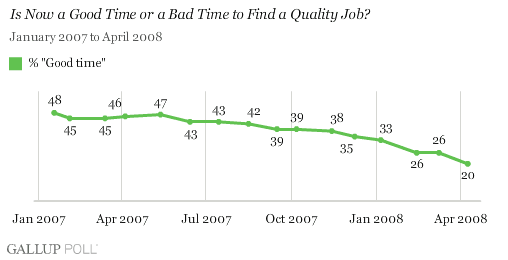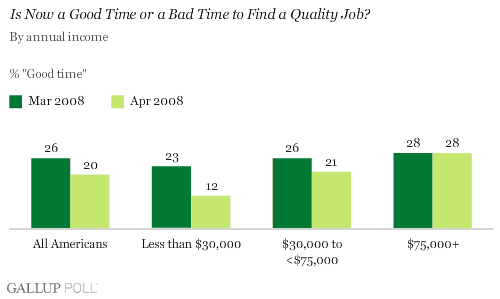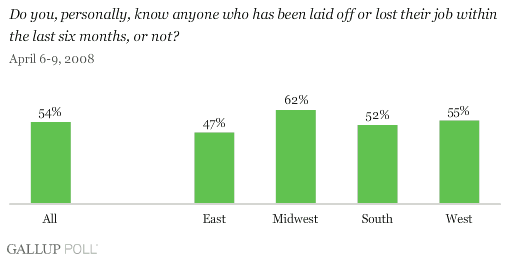PRINCETON, NJ -- The percentage of Americans saying now is a good time to find a quality job fell six percentage points to 20% in April from 26% in March and now stands at less than half its April 2007 reading of 46%.

Lower-Income Americans See Biggest Drop in Job Outlook
Earlier this month, the Labor Department reported that the United States lost 80,000 jobs in March. That was the third straight monthly job loss, and the unemployment rate has now increased to 5.1%. On Thursday, initial jobless claims fell by a more-than-expected 53,000, but the less volatile four-week moving average increased to 378,250, which represents the highest level since late 2005.
Gallup's monthly job measure shows a similarly dismal picture for early April, with just 20% of Americans saying now is a good time to find a quality job. This is down from 26% in March and 46% in April of last year. It is also the lowest percentage for this measure since the 19% recorded in September 2003, and not much better than the record low of 16% of March 2003. The high since ���۴�ýbegan tracking the measure in 2001 is 48% in January 2007.
The April decline in consumer perceptions of the job market differed significantly across income groups. Among those making less than $30,000 a year, positive perceptions of the job market fell by nearly half, from 23% in March to 12% in April. They fell more modestly, from 26% to 21%, among those making $30,000 but less than $75,000. However, job outlook perceptions were unchanged at 28% in April among those making $75,000 or more a year.

Many Americans Know Someone Who Lost His or Her Job
Fifty-four percent of Americans say they know someone who has been laid off or lost his or her job over the past six months. This percentage is up from the 50% who said they knew someone who had lost his or her job a year ago, but is still well below the 63% of April 2003.
The highest regional percentage for this question in the current poll is in the Midwest (62%); those in the West are next, at 55%, followed by 52% in the South and 47% in the East. The current high percentage in the Midwest is most likely explained by the continued decline in U.S. manufacturing during recent times. Of course, given the number of jobs currently being eliminated as a result of the credit crisis, the relative position of the East is likely to change significantly in the coming months.

Underemployment Deserves Consideration
By historical standards, the current 5.1% unemployment rate would be considered close to full employment -- not something associated with a recession. In part, today's relatively low unemployment rate may be because of the economic changes associated with globalization and the transformation of the United States into much more of a services economy. Whether these structural economic changes have reduced or just delayed the usual increase in the unemployment rate associated with a recession remains unclear. Regardless, the real job losses of the past three months in a row tend to confirm that the United States is already experiencing a recession.
Gallup's jobs question taps into not only Americans' perceptions of the unemployment rate, but also their sense of the availability of "quality" jobs. In this context, Gallup's jobs measure might be viewed, at least in part, as a reflection of "underemployment": that is, whether Americans are being forced to take jobs that do not fully make use of their talents, skills, and experience.
Survey Methods
Results are based on telephone interviews with 1,021 national adults, aged 18 and older, conducted April 6-9, 2008. For results based on the total sample of national adults, one can say with 95% confidence that the margin of sampling error is ±3 percentage points.
Interviews are conducted with respondents on land-line telephones (for respondents with a land-line telephone) and cellular phones (for respondents who are cell-phone only).
In addition to sampling error, question wording and practical difficulties in conducting surveys can introduce error or bias into the findings of public opinion polls.
